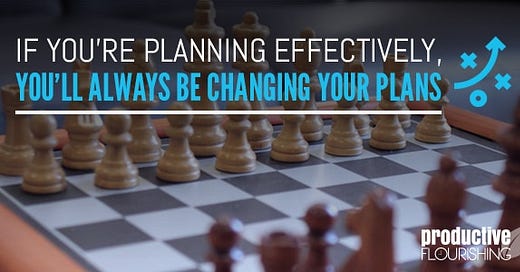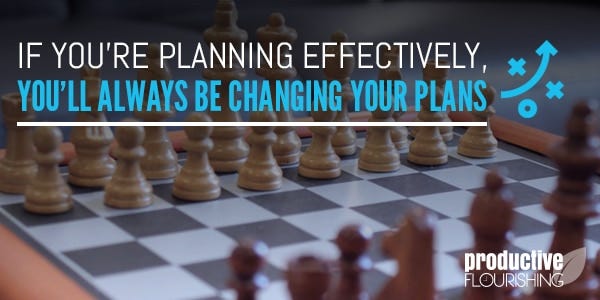If You're Planning Effectively, You'll Always Be Changing Your Plans
The only thing you can do to account for the unexpected is to expect change.
This post was originally published on January 13, 2014.
"In preparing for battle I have always found that plans are useless, but planning is indispensable." — Dwight D. Eisenhower
I want to let you in on a secret: planners and strategists are always planning and (re)developing their strategies. We make plans and strategies knowing full well that we'll need to change those plans and strategies when we implement them.
There's the familiar maxim "no plan survives first contact" that military planners live by — because unless your enemies are potted plants, they will force you to change your plans to account for them. That's obvious in warfare precisely because warfare is a contest of wills, but it's also true for making plans and strategies in general. It turns out that the forces we're all working with and against aren't potted plants, either.
Our coworkers and teammates can do unexpected things to enhance or detract from our momentum. Customers frequently surprise us with their actions. The marketplace takes an unexpected turn. Loved ones get sick, die, or otherwise divert attention. About the only thing you can do to account for the unexpected is to expect that there will be unexpected conditions.
This is why we work at 85% capacity with 100% focus — 85% capacity allows room for the unexpected, and 100% focus ensures that we get a project done as quickly as possible. I want to pause here and flesh out that last idea rather than pass by it so quickly.
The Longer You're Working on a Project, the More Volatile It Will Be
While it's absolutely true that as many good unexpected things as bad unexpected things could occur, it's been my experience that most of the really good things happen after you finish the project. That's when you can get the feedback that matters, good or bad. That's when you can get the distance from the doing of the project to evaluate its merits and determine the next steps for it. That's when you're also able to celebrate that you got something done.
Yes, it's true that we creatives are never really finished with our work because one completed project starts two or three more, so we walk in the crux of the paradox that we must finish the small project we're working on, knowing that we'll never finish the big project we're working on, whether or not we see that our work is part of a bigger project. (You can read more about this whole process and how to celebrate these small project wins in Chapter 9 of Start Finishing.)
After all, everything we do can be pulled into our body of work. As I've mentioned before, success in Project World depends on continually finishing the stuff that matters.
It should be clear, then, that I'm not at all discounting the role serendipity plays in our creative process — I'm saying that shipping projects sooner actually magnifies the positive effects of serendipity because more people interacting with your work exponentially increases the chances that the positive surprises will surface, whereas keeping your work bottled up depends solely on your stumbling on those positive surprises.
So, let's look at it this way: the longer you're working on something (by yourself, where "yourself" could also be your isolated team), the more you're likely to have something throw a monkey wrench in your plans. As soon as you finish whatever you're working on and ship it, the more you're likely to have (positive) serendipity change what you thought would happen, AND completing that one project will create more projects anyway. In either case, your plans and strategies will change.
That's why planners and strategists are always planning and strategizing. Of course, they can also get stuck in not-doing because they love making plans and strategies more than they like doing the work to implement those plans or being wrong about their assumptions, but that's a post for another day. (Serial planners and strategists, I see you. Is it time to get out of your head and into the world?)
Why Bother Planning Effectively If Plans Will Just Change?
The fact that any given plan has a very short shelf-life is also why many people don't make plans and strategies. I've heard it time and time again: why bother with all the work when you'll change it the next day?
(Subtext: planning done right upsets creative people.)
That's a valid question.
Planning (done right) is an awareness-generating process. It helps you identify your goals, resources, timelines, drag points, and key assumptions. It helps you do whatever you're doing more intelligently and effectively, for it helps you avoid the swamps of a project and find the straight paths and favorable winds.
You may still end up in a swamp or perhaps the weather will change, but the very reason we have a word like "unexpected" is that there are an awful lot of things that are predictable. I really don't have much of a reply if the next question from the resistant creative is "Why would I want to do something more intelligently and effectively?" I don't get that question often. But there's something that resistant creatives don't say that needs to be said.
The other reason planning effectively can be an emotional process is that, when you do it right, you see that the only thing standing between you and your goal is you. It's not the world. It's not your history. It's not some mysterious force. It's simply whether you'll make good choices and follow through with action. And for a creative person, finishing can open yourself up to a lot of rejection. Better not to plan. Better to keep working on it in your head. Better to hedge your bets with 17 different projects, all of them in-process, safe, and easy to point to when someone asks you what you've been doing. How's that working for you?
When Reality Changes, Change Your Plans
The only reason we make plans and strategies is because we want the world to look more like what we want it to look like than what it does look like. Otherwise, we'd just let things take their due course and go along for the ride.
A superficial reading of many religions and spiritualities seems to imply that this is the path of spiritual virtue; but read deeper — often just the preceding or next paragraph or verse in context — and you'll likely find the text discussing ways to learn when and how to assert your will and when to see the hand of Providence in play.
In either case, many people get fixated on their plans and on how reality measures up to them. This is backward: when reality changes, change your plans. This doesn't mean give up, though. It means to look at the plan and see how the changes in the world relate to what you've planned out. Remember how I mentioned that planning was an awareness-generating process?
Checking your plan against reality is also an awareness-generating process in that it gives you the opportunity to learn about your decision- and plan-making processes. It lets you tweak the way you make plans, thus making your next project all the more successful.
Reviewing your plans makes you more successful, as does changing them. The point of planning is to help you do things right, after all, not to make a plan that's right. The lead quote from Eisenhower expresses this idea quite nicely. So, though it's counter-intuitive, if you're planning effectively, you'll always be changing your plans.
If you want to learn how to make yourself more efficient in the midst of shifting plans, or how to set up your environment to accomplish your best work, Chapter 8 of Start Finishing is for you.





